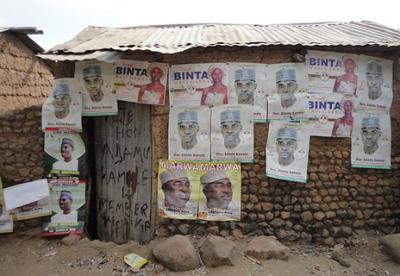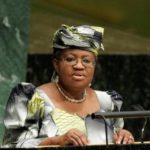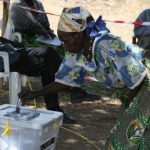With the defection of five governors to the opposition All Progressives Congress, is the dominance of the ruling People’s Democratic Party finally crumbling?
By Lagun Akinloy

At the end of November, Nigeria’s political landscape experienced a seismic shift as five governors and a number of members of the House of Representatives and Senators renounced their membership of the ruling People’s Democratic Party (PDP) and decamped en masse to the increasingly powerful opposition All Progressives Congress (APC).
Citing disgruntlement with the actions of President Goodluck Jonathan and PDP chair Bamanga Tukur, the defected governors and APC released a joint announcement declaring that they had no choice but join forces “in order to rescue our fledgling democracy and the nation.”
In response, the PDP tried to both downplay the merger, with spokesperson Olisa Metuh, remarking that “the defectors have embraced a narrow group of ethnic and religious bigots whose main intention is to unleash a state of anarchy on Nigeria. We remain unperturbed as we are now rid of detractors and distractions.”
Nevertheless, there is no doubt that the PDP, which has dominated the political scene ever since Nigeria returned multi-party elections in 1999, is facing by far the strongest challenge to its authority in its history. Along with the absconding of five governors, the ruling party’s majorities in the House of Representatives and Senate have also been significantly cut back, and the APC is even now trying to claim that the PDP – the self-proclaimed ‘largest political party in Africa’ – is now a minority party.
A faltering giant
As president, Jonathan has had to contend with all manner of well-documented economic, structural and security troubles facing Nigeria, but it has probably been the infighting within his own party that has most frequently kept him up at night. And opposition to Jonathan’s leadership within the PDP began shortly after his unexpected rise to the presidency.
One of the main cleavages in Nigeria is the division between north and south, and to resolve this, the PDP had an unwritten agreement that the presidency would alternate between a northerner and southerner, each holding office for two four-year terms. In addition, any president from the north would have a deputy from the south, and vice versa.
In 2007, after 8 years under southerner Olusegun Obasanjo, northerner Umaru Musa Yar’Adua was elected president with Jonathan as his running mate. The PDP’s rotational system seemed to be working until in 2010, Yar’Adua died from complications arising from a protracted illness.
Jonathan stepped up to take his seat, but many northerners in the PDP felt they had been robbed of their promised time in office. These grievances intensified when Jonathan then contested the 2011 elections and have continued to grow as the possibility of Jonathan running again in 2015 seems to be becoming increasingly likely. If he were to run and win, Nigeria will have had a southern president for 17 of its 20 years as a multi-party democracy by the time his term would end in 2019.
However, disgruntlement within the PDP is not all related to north-south politicking. Jonathan has also been accused of running the party undemocratically to shore up his own authority and of marginalising figures he sees as potential challengers.
This came to a head at the PDP’s national conference this September when various candidates seen as being allied to Jonathan’s rivals were disqualified in their bids to join the party’s National Working Committee. This was the last straw for many, and a group of seven governors, led by former vice-president Atiku Abubakar, stormed out of the convention and announced the formation of a rival PDP. Abubakar described the move as an attempt to “save the PDP from the antics of a few desperadoes who have no democratic temperament and are bent on hijacking the party for selfish ends.”
Numerous PDP overtures were made to the breakaway faction to sheath their swords, including some from former president Obasanjo, but all these were rebuffed. The seven rebels governors – referred to by some as G7 – insisted that they would only return to the PDP if Jonathan sacked chairman Bamanga Tukur, who they accused of destabilising state chapters and heavy-handedness, and vowed not to run in the 2015 elections.
Neither of these demands were forthcoming and according to Sani Bello, a fellow at the African Leadership Forum, Jonathan and Tukur only have themselves to blame for the fallout.
“Jonathan did not expect to face such mutiny within the party ranks,” he told Think Africa Press. “He attempted to call the bluff of the governors and the move backfired. Many of those who left the PDP have ambitions of their own and simply could not achieve this with Jonathan and Tukur refusing to budge, which left them with no other option.”
The new pretenders
The five governors who joined the APC last month came from this group of seven. They were Rabiu Kwankwaso (Kano State), Aliyu Wamakko (Sokoto State), Murtala Nyako (Adamawa State), Abdulfatah Ahmed (Kwara State) and Rotimi Amaechi (Rivers State). Two of G7 – Babangida Aliyu (Niger State) and Sule Lamido (Jigawa State) – opted against the merger, promising instead to fight injustice in the PDP from within.
The defection now means that the APC has 16 of Nigeria’s 36 governors, while the PDP has 18. With an eye on the 2015 elections, however, it is notable that both Lagos and Kano states – the country’s two most populous by some distance – both now fly the flag of the APC, and that if you add up voter populations in the states held by the APC as compared to those held by the PDP, the opposition party’s states account for 52% of the electorate.
Having towered over all other political parties since 1999 and having won election after election without ever being realistically challenged, the PDP is now faced with a formidable challenger. However, the prospect facing that challenger is also unprecedented, and although the APC is made up of several seasoned political veterans, the party itself is less than a year old and numerous internal challenges remain.
Perhaps the most important of these difficulties derives from the party’s very strength. The APC was formed in February in a merger of Nigeria’s four largest opposition groups – the Action Congress of Nigeria (ACN), the Congress for Progressive Change (CPC), the All Nigeria Peoples Party (ANPP), and the All Progressives Grand Alliance (APGA) – and the party boasts numerous political heavyweights including former Lagos governor Bola Tinubu, three-time presidential candidate and former military ruler Muhammadu Buhari, and former government minister Nasir El-Rufai. This gives the APC a large degree of recognisability and legitimacy, but at the same time, it remains to be seen how the party will accommodate the various interests, personalities and ambitions of its leading members.
The APC has also been painted by some as simply forming an ethnic bloc of Hausa-Fulani and Yoruba constituencies in a bid to gang up against Jonathan and his Igbo supporters. Indeed, ethnic jostling has long been an important feature of Nigeria’s political system, and group favouritism – or marginalisation – was at the root of much of the PDP’s internal strife.
Max Siollun, author of Soldiers of Fortune: Nigerian Politics from Buhari to Babangida, however believes that seeing Nigeria’s recent developments in purely ethnic terms is overly simplistic. “We should not necessarily view the APC as a Yoruba-Hausa merger,” he says. “After all the governments in the first and second republics featured coalition governments formed by northern parties and an Igbo party led by Nnamdi Azikiwe.”
Brave new world
Although the tide has been turning for some time, the dramatic events of this past year have carved out a new era of Nigerian politics. What this brave new world will look like remains to be seen. The PDP is still reeling from its high-level defections, while the APC has yet to demonstrate whether its ambitions and visions extend beyond just defeating the PDP.
Nevertheless, political analyst Raymond Eyo believes the shift in Nigeria’s political landscape can only be a good thing for democracy. “The defections will benefit the Nigerian people as it deepens democracy and will lead to the enhancement of a two-party system that is more competitive and can be more productive than the present dominant one-party rule,” he says.
Indeed, after nearly 15 years of PDP rule and dominance in which the real decisions over presidents have been made in the party’s corridors of power rather than at the ballot box, many ordinary Nigerians are thirsty for change. Citizens are tired of scandal after scandal revealing high-level corruption, of crucial bills that could reform faltering sectors stagnating in the Senate and House of Representatives, and of political squabbling overshadowing all else in government. Nigeria’s political scene may be in turmoil, but some will be thinking that that’s exactly what was needed.

